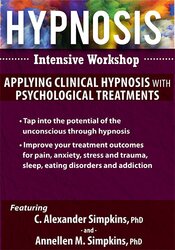
Get immediate lifetime access to this content by purchasing the digital seminar/online course instead that you can access using a variety of devices, and one CE certificate is included with purchase! Click the “Digital Seminar” or "Online Course" link below to learn more!
DVD Purchasers please note: In order to view the content, you will be required to have a DVD player or a DVD drive on your computer. Your CE is a separate fee.

Transform your practice to heal anxiety, stress and trauma, sleep, eating disorders, and addiction and pain with this Intensive Workshop.
The unconscious is a reservoir of potential, and hypnosis is the way to access that potential. Neurological pathways function automatically and can be engaged and used to help heal disorders that might be difficult to do deliberately and consciously. By working indirectly and unconsciously in hypnosis, you bypass your client’s conscious limitations and enlist resources to help resolve entrenched problems.
This is your opportunity for personal self-transformation as you also learn about hypnotic techniques that can be applied for clients.
If you are new to hypnosis, you will gain the skills you need to start using hypnosis in your practice. And if you are an experienced hypnotherapist, you will add innovative methods to enhance your work. With the latest research, case examples, guided trance experiences, opportunities to work with trance induction, helpful handouts, protocols, and a clear understanding of hypnotic effects in the brain, this workshop will inform, uplift, and transform.
| File type | File name | Number of pages | |
|---|---|---|---|
| Manual - Hypnosis Intensive Workshop: Applying Clinical Hypnosis with Psychological Treatments (7.92 MB) | 173 Pages | Available after Purchase |

C. Alexander Simpkins, Ph.D. & Annellen M. Simpkins, Ph.D, are psychologists specializing in neuroscience, psychotherapy, meditation and hypnosis. Drs. Simpkins have been practicing psychotherapy for more than three decades; and have been researching and practicing hypnotherapy and meditation for four decades, studying hypnosis under G. Wilson Shaffer, dean of Johns Hopkins University, and Director of the Hopkins Counseling Center; hypnotherapy under Harold Greenwald, creator of Direct Decision Therapy; and indirect hypnosis with Milton H. Erickson and Ernest Rossi. They have taught their meditative and hypnotic methods to facilitate mind-brain change to people of all ages. Additionally, they have been involved in neuroscience for 15 years and have been integrating it into treatments and helping to bring the most recent research findings to practitioners. They present seminars at professional conferences, state mental hospitals, university campuses and to popular and professional audiences around the world.
The Simpkins are authors of 26 books, many of them bestsellers. Their most recent book is Yoga & Mindfulness Therapy Workbook for Clinicians and Clients (PESI, 2014). Drs. Simpkins have written many books on neuroscience such as, Neuroscience for Clinicians (Springer, 2012), The Dao of Neuroscience (Norton, 2010) and Neuro-Hypnosis (Norton 2010); as well as hypnosis titles: Self-Hypnosis for Women (Radiant Dolphin press, 2004), and Effective Self-Hypnosis with CD (Radiant Dolphin Press, 2000). Their books have over 20 foreign editions and have won numerous awards.
Speaker Disclosures:
Financial: Charles A. Simpkins is in private practice. He receives a speaking honorarium from PESI, Inc. He has no relevant financial relationships with ineligible organizations.
Non-financial: Charles A. Simpkins has no relevant non-financial relationship to disclose.
Financial: Annellen Simpkins is in private practice. She receives a speaking honorarium from PESI, Inc. She has no relevant financial relationships with ineligible organizations.
Non-financial: Annellen Simpkins has no relevant non-financial relationship to disclose.
|
Hypnosis Intensive Workshop: Applying Clinical Hypnosis with Psychological Treatments
- Product Code RNV048965 |
Access never expires for this product.
| 5 |
|
| 4 |
|
| 3 |
|
| 2 |
|
| 1 |
|
Satisfaction Guarantee
Your satisfaction is our goal and our guarantee. Concerns should be addressed to: PO Box 1000, Eau Claire, WI 54702-1000 or call 1-800-844-8260.
ADA Needs
We would be happy to accommodate your ADA needs; please call our Customer Service Department for more information at 1-800-844-8260.
PESI Mobile App
Access CE trainings on your phone or tablet through our free mobile app. Choose video or audio-only versions of online courses from the world’s best instructors, and complete your CE requirements anywhere, anytime, at your own pace.
Please wait ...